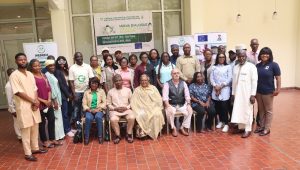The National Environmental Standards and Regulations Enforcement Agency (NESREA) has called for the adoption of a circular economy model to effectively manage Nigeria’s solid waste generation, which is projected to be more than 32 million metric tonnes per year.

This strategy, the agency noted, is important to the country’s long-term development goal because of its unique approach to the use and management of natural resources.
Speaking to participants at a media dialogue organised by NESREA in collaboration with the European Union (EU) in Abuja on Thursday, September 26, 2024, Dr. Innocent Barikor, the agency’s director general, disclosed that the call became necessary because of the model’s significant alignment with President Bola Tinubu’s administration’s eight-point agenda, mostly in the areas of economic growth, job creation, food security, and reducing poverty.
According to him, the benefits of the circular economy are already being felt in all sectors where the model has been implemented, assuring Nigerians that the country will soon see substantial reductions in waste management and other forms of pollution across the country.
In light of this, he continued, Nigeria has long embraced this approach, which his organisation is currently putting into enforcement through the Extended Producer Responsibility (EPR) initiative.
“Food and beverages, batteries, electrical/electronics, and used tires are all regulated under the EPR program,” the agency’s boss stated, adding that manufacturers, producers, and importers of these items are all required to join their respective Producer Responsibility Organisations (PRO) as part of regulatory compliance.
Despite some of the rewards outlined above about the circular economy theory, the DG believes that it’s still very important to raise awareness to help enhance public understanding of this life-changing framework and its contributions to sustainable development. Thus, the discussion on the issue, which he called stakeholders’ attention to, was intended to bridge that knowledge gap, particularly among media members who act as information carriers.
Godfrey Ogbemudia, the EU’s programme manager for Energy, Circular Economy, and Climate Change, revealed in his remarks at the event that the EU is helping NESREA carry out the programme to assist Nigeria in moving away from its current linear economic pathway, which is negatively degrading the environment.
Ogbemudia, like the NESREA’s chieftain perspective, strongly stressed the vital place of civic education in achieving this lofty goal.
“The EU is partnering with NESREA to create awareness on the circular economy because we take it very seriously,” he stated.
When discussing the role of the media in the “Circular Economic Value Chain,” EU facilitator, Mrs. Agharese Onaghise, agreed that the media is a force for change because of its power to influence public opinion through a systematic method of disseminating information.
Consequently, she exhorted the professionals to use their positions to promote the sustainable development agenda by empowering people, educating them, and fostering a culture of ecological stewardship.
By Etta Michael Bisong, Abuja
